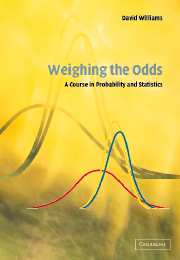Book contents
- Frontmatter
- Contents
- Preface
- 1 Introduction
- 2 Events and Probabilities
- 3 Random Variables, Means and Variances
- 4 Conditioning and Independence
- 5 Generating Functions; and the Central Limit Theorem
- 6 Confidence Intervals for one-parameter models
- 7 Conditional pdfs and multi-parameter Bayesian Statistics
- 8 Linear Models, ANOVA, etc
- 9 Some further Probability
- 10 Quantum Probability and Quantum Computing
- Appendix A Some Prerequisites and Addenda
- Appendix B Discussion of some Selected Exercises
- Appendix C Tables
- Appendix D A small Sample of the Literature
- Bibliography
- Index
1 - Introduction
Published online by Cambridge University Press: 05 June 2012
- Frontmatter
- Contents
- Preface
- 1 Introduction
- 2 Events and Probabilities
- 3 Random Variables, Means and Variances
- 4 Conditioning and Independence
- 5 Generating Functions; and the Central Limit Theorem
- 6 Confidence Intervals for one-parameter models
- 7 Conditional pdfs and multi-parameter Bayesian Statistics
- 8 Linear Models, ANOVA, etc
- 9 Some further Probability
- 10 Quantum Probability and Quantum Computing
- Appendix A Some Prerequisites and Addenda
- Appendix B Discussion of some Selected Exercises
- Appendix C Tables
- Appendix D A small Sample of the Literature
- Bibliography
- Index
Summary
Please, do read the Preface first!
Note. Capitalized ‘Probability’ and ‘Statistics’ (when they do not start a sentence) here refer to the subjects. Thus, Probability is the study of probabilities, and Statistics that of statistics. (Later, we shall also use ‘Statistics’ as opposed to ‘statistics’ in a different, technical, way.) ‘Maths’ is English for ‘Math’, ‘Mathematics’ made friendly.
Conditioning: an intuitive first look
One of the main aims of this book is to teach you to ‘condition’: to use conditional probabilities and conditional expectations effectively. Conditioning is an extremely powerful and versatile technique.
In this section and (more especially) the next, I want you to give your intuition free rein, using common sense and not worrying over much about rigour. All of the ideas in these sections will appear later in a more formal setting. Indeed, because fudging issues is not an aid to clear understanding, we shall study things with a level of precision very rare for books at this level; but that is for later. For now, we use common sense, and though we would later regard some of the things in these first two sections as ‘too vague’, ‘non-rigorous’, etc, I think it is right to begin the book as I do. Intuition is much more important than rigour, though we do need to know how to back up intuition with rigour.
- Type
- Chapter
- Information
- Weighing the OddsA Course in Probability and Statistics, pp. 1 - 34Publisher: Cambridge University PressPrint publication year: 2001



